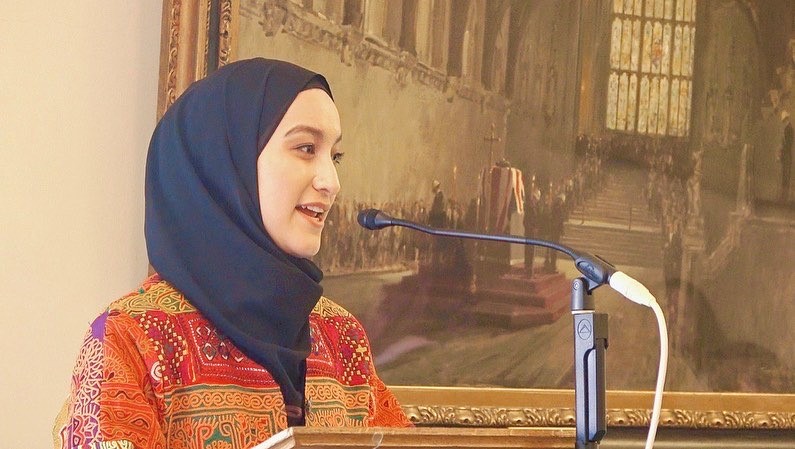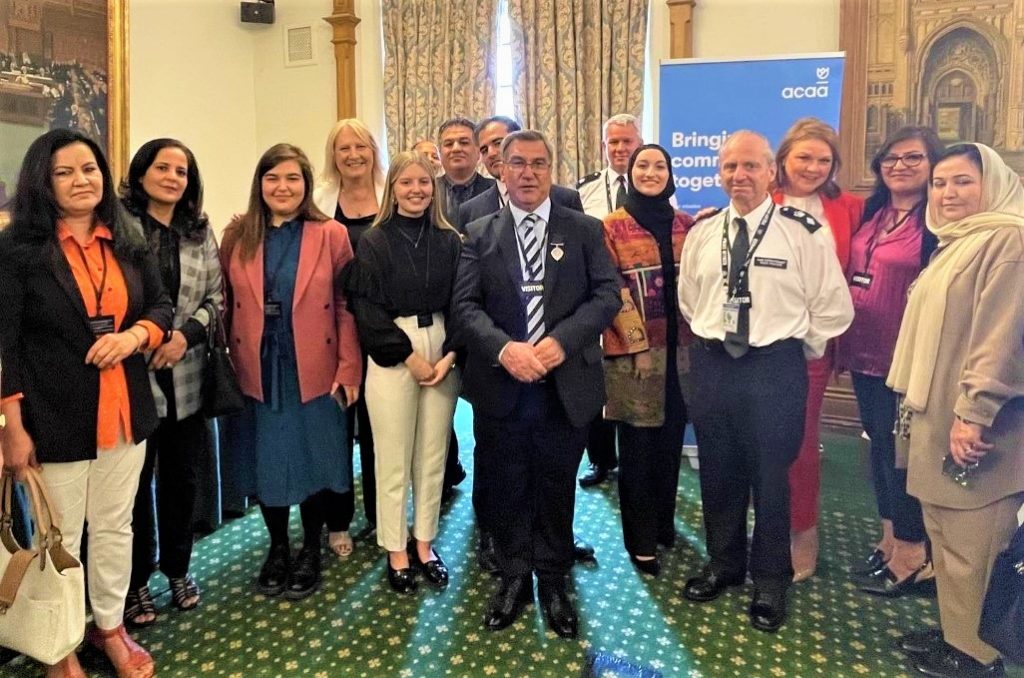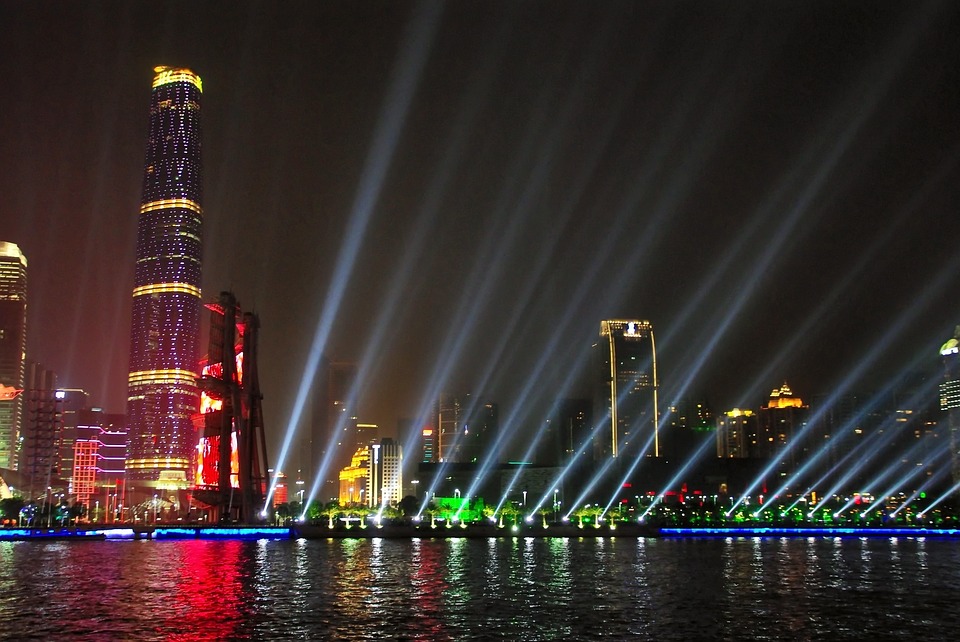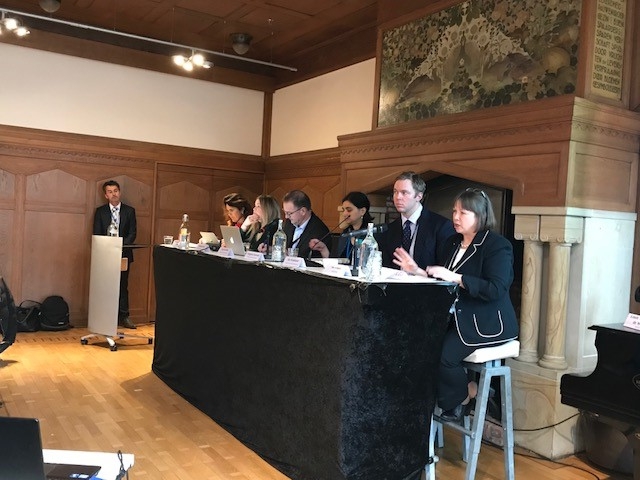MSc student at LSE Department of Gender Studies Sveto Muhammad Ishoq recounts her experience participating in an event held in the House of Commons on ‘The Pivotal Point: Refugees and Resettlement’ as part of UK Refugee Week 2022. Sveto, who was the event’s keynote speaker, shared her personal experiences as a refugee from Afghanistan and highlighted the imperative to welcome refugees in the UK and improve the asylum system.
On 21 June 2022, during UK Refugee Week, the Afghanistan and Central Asian Association (ACAA) organized an event titled ‘The Pivotal Point: Refugees and Resettlement’ at the House of Commons. The purpose of the event was to raise awareness of and discuss issues surrounding refugees, especially given the recent Rwanda-UK refugee deal, which calls for crucial discussion to take place.
The event took place in Churchill Room of the House of Commons sponsored by David Simmonds, MP and started with an opening remark from Dr. Nooralhaq Nasimi, a former refugee and the founder of ACAA. He described his life journey of navigating life in the UK and raising children despite the challenges and barriers he faced in building his new life. He also shared his vision for his organization and his passion for helping the newly arrived refugees through his organization.
Being a refugee is never a choice.
I was humbled to be a keynote speaker at this important event and spoke next. I started with the line, ‘Being a refugee is never a choice.’ As someone who has experience of being a refugee in several countries, I understand the struggles we go through, and it was personally important for me to represent the voices of refugees and of Afghan women on this global stage. I shared how my refugee journey began when I was only six months old, when my family was forced to flee the war-torn city of Kunduz, Afghanistan to seek refuge in Tajikistan and later in Kazakhstan. I also shared my journey to become an activist for Afghan women’s rights and my passion and purpose in life – to serve the people and the women of my beloved country, Afghanistan. It was an emotional experience to share my story on this global platform, but there a valuable purpose in it: to inspire, to make people think, to raise awareness about the struggles of people being forced to leave their homes. I want the world to know the bravery of Afghan people, our resilience, courage and determination.

After my keynote speech, we started a panel discussion on the issue of refugees and resettlement in the UK with distinguished panellists Enver Solomon from the Refugee Council, Catherine West, MP, Dr. Nooralhaq Nasimi from the Afghanistan and Central Asian Association (ACAA) and Chief Superintendent Sean Wilson from the Metropolitan Police. We all agreed that respecting human rights is imperative, especially in the case of refugees, and that now more than ever we need better protection and resettlement processes in the UK.
Now more than ever we need better protection and resettlement processes in the UK
The topics we discussed included: the Rwanda-UK deal; Afghan refugees still being kept in hotels 11 months after their evacuation in August 2021; mental health issues for refugees; and the policies of the UK government around refugees and resettlement schemes. Catherine West emphasized the need for refugees to be allowed to work as it gives them dignity. Enver Solomon talked about the importance of refugees being allowed to invite their family members to the UK, giving them a chance to reunite with their families without limitations. Chief Superintendent Sean Wilson discussed the significant mental health issues among refugees. I could understand this all too well. Since Afghanistan’s collapse last August 2021, thousands of Afghans were forced to flee their country. The UK alone has evacuated around 18,000 Afghans, most of whom are still stranded in hotels with their children and families. I have friends in London hotels and every time I visit them, it is evident that being stuck in that situation causes many problems for their mental health and wellbeing.
We have to see the enormous contribution refugees make to the host country’s economy
My messages in the panel discussion were very clear: firstly, that the Rwanda deal has deeply harmful implications for lives of refugees, who face so many challenges and put their lives in danger to get to the UK. Sending them to a country with a record of human rights abuses instead of accommodating them in the UK is inhumane. I also emphasized the fact that there is a clear distinction between the Afghan Citizens Resettlement Scheme (ACRS) and the Ukrainian Resettlement Scheme. ACRS is markedly different, as it has a complicated and vague procedure, a much lower success rate, and it takes years before decisions are made by the Home Office. Enver Solomon reinforced this point and emphasized the fact that within the asylum system, there are differences in how people are treated based on races and nationalities. I also argued that refugees should not be seen as a ‘burden’ to countries: we have to see the enormous contribution refugees make to the host country’s economy, and there are many examples, one of whom is Dr Waheed Arian.

Attending this event and speaking about these challenges was important to me. Since moving to the UK last August, I witnessed how my friends and my team members at my organization, The Chadari Project, fled the country. Now, in addition to raising awareness about multiple crises happening in Afghanistan, my activism includes speaking about refugee and resettlement issues and advocating for improvements in resettlement processed, as I consider this my responsibility as an Afghan and as a former refugee.
The views expressed in this post are those of the author and in no way reflect those of the International Development LSE blog or the London School of Economics and Political Science. Image Credits: Sveto Muhammad Ishoq.





